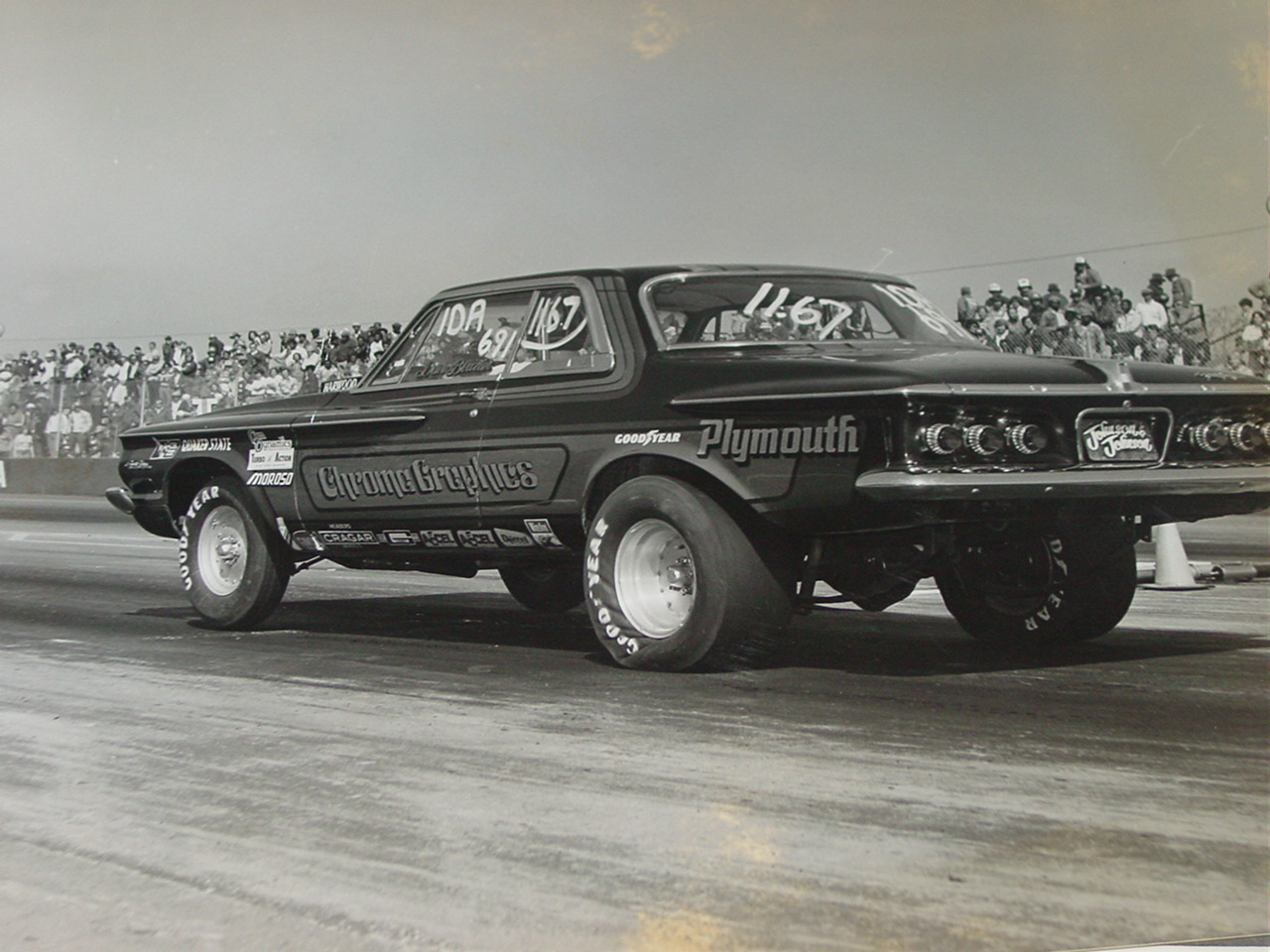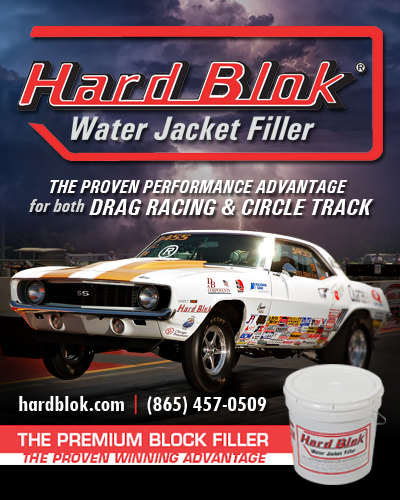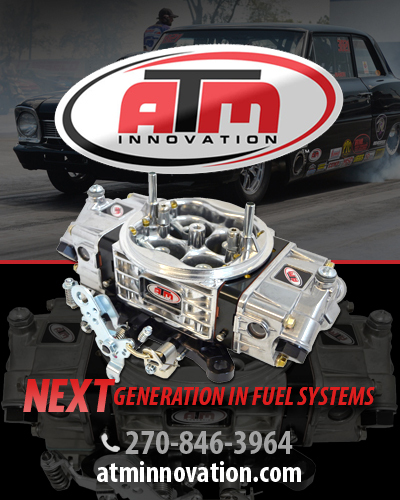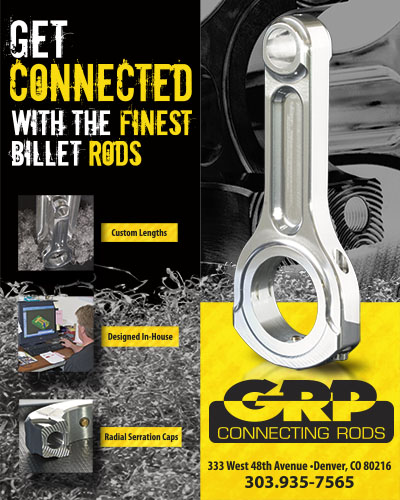PRO STOCK'S JOHNSON PONDERS WHAT MIGHT HAVE BEEN

In one second – a single second – a hummingbird beats its wings 70 times, a cheetah dashes 34 yards, and a telephone signal travels 100,000 miles. We blink. We snap our fingers. But
 Mike Edwards' Pro Stock margin of victory over Allen Johnson in the 2012 final round at Bristol Dragway was less than that.
Mike Edwards' Pro Stock margin of victory over Allen Johnson in the 2012 final round at Bristol Dragway was less than that.
The clocking was .0000 of a second, something that never occurred in the final round of any event in NHRA history before or since. The numbers would have impressed even a jaded physics genius, but all they did that June 17, Fathers Day, was stun Edwards and break home-area hero and No. 1 qualifier Johnson's heart. "Lord, we'd rather shake the tires, hit the wall, do anything as to lose like that. When it's your day, it's your day. It just wasn't our day," Johnson said immediately afterward.
That wasn't Johnson's first poignant racing defeat. It wasn't even a life-altering a twist of circumstances – Johnson had had one of those, too. And sometimes, as the 55-year-old Greeneville, Tenn., team owner / businessman / 2012 NHRA Pro Stock champion looks back on his life, he wonders about the road not taken. He wonders every now and again what his life might have been like if he hadn't crossed paths with a fellow named Deat Buckner or if he hadn't suffered a broken ankle in his final football game. Which dream would have come true for him – a career in NHRA Pro Stock racing or one in the United States Marine Corps?
To begin with, Johnson proudly watched his father Roy work hard – "take a nickel and make a dime out of it," as the elder Johnson put it – so he could afford to go racing. And he watched his father win, beating his keenest rivals sometimes on half the money but twice the will. But the son went through a period when he just wanted to be a carefree teenager and didn’t want to go anymore to the racetrack.
"We stayed in one room, all nine of us," Allen Johnson's mom and Roy Johnson's wife Revonda recalled of the family and team on the road. "We took the mattress off the bed, and some people slept on the floor on the mattress and some slept on the bed on the [box] spring[s]. We took bologna and cheese. We ate potted meat and Beenie Weenies. All the money we had had to go to getting the car in the lane."

Roy Johnson won the 1976 and 1977 championships in that class, and Allen Johnson had his chance to repeat his dad's accomplishment in 1979. That chase came down to a final-round showdown in the Winston Nationals at Commerce, Ga. – at what then was called Atlanta International Dragway. It was Allen Johnson versus Deat Buckner, and whichever one won that final found also earned the championship.
"We went back and forth all year," Allen Johnson, who was campaigning a '62 Plymouth Sports Fury with a 318 [engine] and two-barrel [carburetor], said. "And shoot, I didn’t have enough money to race. Dad was struggling himself to have enough money to race. But we made it work somehow. I remember Atlanta like it was yesterday. I had a bye run in the semifinal. We were fired up for the finals, and I remember them calling us to the lanes. I went out and cranked up my car, and the d*** crank[shaft] blew up in the pits. Never got to make he run."
Deat Buckner and his '65 Nova stickshift car – by five measly points – became the champion without a challenge.
"We just had a pick-up truck and an open trailer at that time," he said. "I just went in the back of the pick-up truck and cried like a damn baby. I mean, it was bad. I was only what – 19 years old? That was horrible."
Johnson said he never got the chance again to compete for a sportsman championship: "I never even got close again. Chrysler pulled out in 1980 and went bankrupt. Dad lost his sponsorship. We quit racing the national events. I raced around, bracket racing and stuff, through '81.Dad went and drove Jim Danuels' Opal in NHRA Com Eliminator. I didn’t have any money and was racing on a shoestring."

"They had all the money in the world, and we didn’t have any," Allen Johnson said. "Of course, they tried to run our class an outrun us and never could. Dad worked night and day just to stay ahead, and them boys had all the money in the world and hired [Gene] Fulton and everybody else to build their motors. And we were doing everything out of our little one-car garage. They were after us. F/Automatic was the class – 2F/3F . . . one [was] four-barrel, one was two-barrel. They built Camaro after Camaro, trying to outrun us. I don’t think they ever did it. They came close, but they spent a lot of money."
An NHRA Pro Stock career, let alone a championship, was beyond comprehension, he said.
"I didn’t think that dream was reachable, by any means, because my dad couldn’t reach it. He had dreamed about it for a lot of years. I was already dreaming about it. It just seemed like something that was a fairy tale, I guess you would call it," Johnson said. "People like us didn’t get there at all. We could dream about it, but that was about it. I got lucky in business and was able to get us started. That's the only way we got started."
Roy Johnson told his son he only could go big-time racing when he earned his college degree and saved money to do it properly. But that almost didn’t happen.
"In 1977, I already had my walking papers and had enlisted in the Marines on the delayed-entry program," Allen Johnson said. "But in my last [high-school] football game, I broke my ankle and I got an honorary discharge before I ever [reported].
"What if I had gone to the Marines? I just might have won that championship, and a lot of other doors may have opened," he said. "I may have been driving the Wayne County car instead of Darrell [Alderman]." With a laugh, he referred to himself as "the other Dodge Boy."
In the Marines, his career path has been laid out as a jet mechanic.
"I grew up in the shop with Dad. That's all I did, you know?" he said. "And after all that happened, somehow or other, I got to go to college and got my accounting degree. I may have been working on jets today. He said a career in the Marine Corps "was my goal. It just never worked out."
What did work out was Roy Johnson's savings plan. The former dealership mechanic, who was up and off to the store by 6 a.m. each working day, said the IHRA paid enough in winnings to help his family.
"I paid my home off. The first thing I did was save enough money in case each one of my kids wanted to go to college," Roy Johnson said. "I had a pretty good start. The way I raced back then, I won enough money from IHRA and local racing that it got us out of trouble."
So Allen Johnson attended East Tennessee State University and earned a degree in accounting. Even then, it took time for him to find a rhythm in the business world – one that today includes Greeneville Oil and Petroleum Inc., and its nearly 50 Marathon gas station/Quick Stop Markets, interest in Nolichucky View Golf Club, and properties that accommodate a pawn shop, hair salon, and warehouses. Like his dad, he saved his money and formed his team. But even when he took the official plunge in 1996, he didn’t start moving up the ladder right away. Through the years, he gradually found the right personnel, parts, and partners to make that championship run. It took at least 10 years before he consistently scored top-10 finishes, although he did make the top 10 three times in his first NHRA decade.
With that 2012 loss to Edwards, Johnson said, "We'll get in the history books one way or another." But he went on that November to win for him and for his father what they had dreamed of for so many years and proved it wasn't a pipe dream. They got in the record books, all right – as champions.
Right after that Bristol disappointment, Johnson said, "That's Pro Stock racing at its best. We're going to run up against a chain saw every now and then. We could race 10 times and do that again and I'd win half and he'd win half. That's how close Pro Stock racing is this year."
He could say the same at this weekend's Thunder Valley Nationals at Bristol, Tenn. His opponents are just as fierce. So is his desire to give his dad a Wally trophy from Bristol Dragway on Fathers Day and to give his crew and employees and family and friends what he described as "the excitement of a win here at home."
Fans will bring Allen Johnson faded copies of the IHRA's Drag Review Magazine and old photographs articles, and memorabilia from the young days of his career, and he fondly strolls down Memory Lane with them. "That was a fun time," he said.
As for wondering what it all means, he said, "I wonder a lot, especially now. Back then I was just a kid – I didn’t wonder about nothin'. You just go day to day. But afterwards you look back and think, 'What if I had gone in the Marines? What if I had done this, done that?"
It doesn't matter now. This is the path he has carved for himself or that has been carved for him – or both. What might have been is less important than what is and what will be. And today Allen Johnson is ready for a weekend without any "woulda-shoulda-coulda" kind of talk.





































